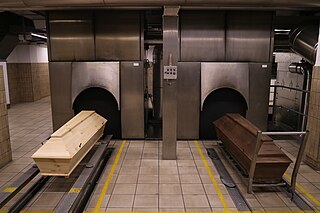Related Research Articles

A funeral is a ceremony connected with the final disposition of a corpse, such as a burial or cremation, with the attendant observances. Funerary customs comprise the complex of beliefs and practices used by a culture to remember and respect the dead, from interment, to various monuments, prayers, and rituals undertaken in their honour. Customs vary between cultures and religious groups. Funerals have both normative and legal components. Common secular motivations for funerals include mourning the deceased, celebrating their life, and offering support and sympathy to the bereaved; additionally, funerals may have religious aspects that are intended to help the soul of the deceased reach the afterlife, resurrection or reincarnation.

Cremation is a method of final disposition of a dead body through burning.

Burial, also known as interment or inhumation, is a method of final disposition whereby a dead body is placed into the ground, sometimes with objects. This is usually accomplished by excavating a pit or trench, placing the deceased and objects in it, and covering it over. A funeral is a ceremony that accompanies the final disposition. Evidence suggests that some archaic and early modern humans buried their dead. Burial is often seen as indicating respect for the dead. It has been used to prevent the odor of decay, to give family members closure and prevent them from witnessing the decomposition of their loved ones, and in many cultures it has been seen as a necessary step for the deceased to enter the afterlife or to give back to the cycle of life.

The Department of Health and Social Care (DHSC) is a ministerial department of the Government of the United Kingdom. It is responsible for government policy on health and adult social care matters in England, along with a few elements of the same matters which are not otherwise devolved to the Scottish Government, Welsh Government or Northern Ireland Executive. It oversees the English National Health Service (NHS). The department is led by the Secretary of State for Health and Social Care with three ministers of state and three parliamentary under-secretaries of state.

A morgue or mortuary is a place used for the storage of human corpses awaiting identification (ID), removal for autopsy, respectful burial, cremation or other methods of disposal. In modern times, corpses have customarily been refrigerated to delay decomposition.

Burial at sea is the disposal of human remains in the ocean, normally from a ship, boat or aircraft. It is regularly performed by navies, and is done by private citizens in many countries.

The majority of funerals in Japan include a wake, the cremation of the deceased, a burial in a family grave, and a periodic memorial service. According to 2007 statistics, 99.81% of deceased Japanese are cremated.

Roman funerary practices include the Ancient Romans' religious rituals concerning funerals, cremations, and burials. They were part of time-hallowed tradition, the unwritten code from which Romans derived their social norms. Elite funeral rites, especially processions and public eulogies, gave the family opportunity to publicly celebrate the life and deeds of the deceased, their ancestors, and the family's standing in the community. Sometimes the political elite gave costly public feasts, games and popular entertainments after family funerals, to honour the departed and to maintain their own public profile and reputation for generosity. The Roman gladiator games began as funeral gifts for the deceased in high status families.
Disposal of human corpses, also called final disposition, is the practice and process of dealing with the remains of a deceased human being. Disposal methods may need to account for the fact that soft tissue will decompose relatively rapidly, while the skeleton will remain intact for thousands of years under certain conditions.
The Human Tissue Authority (HTA) is an executive non-departmental public body of the Department of Health and Social Care in the United Kingdom. It regulates the removal, storage, use and disposal of human bodies, organs and tissue for a number of scheduled purposes such as research, transplantation, and education and training.

Clement Attlee was invited by King George VI to form the Attlee ministry in the United Kingdom in July 1945, succeeding Winston Churchill as Prime Minister of the United Kingdom. The Labour Party had won a landslide victory at the 1945 general election, and went on to enact policies of what became known as the post-war consensus, including the establishment of the welfare state and the nationalisation of some industries. The government's spell in office was marked by post-war austerity measures, the violent crushing of pro-independence and communist movements in Malaya, the grant of independence to India, the engagement in the Cold War against Soviet Communism as well as the creation of the country's National Health Service (NHS).
Freedom of information (FOI) in the United Kingdom refers to members of the general public's right to access information held by public authorities. This right is covered in two parts:
- Public authorities must regularly publish updates and information regarding their activities, and
- Members of the public can make requests for information and updates regarding the activities of public authorities.

The Burial Act 1857 is an act of the Parliament of the United Kingdom. It is one of the Burial Acts 1852 to 1885. Its purpose is to regulate burial grounds. It regulates where and how deceased people may be buried, and provides for the exhumation of remains. The Act made it illegal to disturb a grave. The Act did not make it illegal to steal a dead body, and it is only the opening of the grave which constitutes an offence, not the removal of the contents.

Antyesti literally means "last sacrifice" or "final auspicious ceremony", and refers to the funeral rites for the dead in Hinduism, which usually involves cremation of the body. This rite of passage is the last samskara in a series of traditional life cycle samskaras that start from conception in Hindu tradition. It is also referred to as Antima Samskara, Antya-kriya, Anvarohanyya, or as Vahni Samskara.

Deaths in Singapore offset the population increase from live births. In 2007, 17,140 people in Singapore died from various causes. The death rate was 4.5 deaths per 1,000 of the population. There are strict regulations surrounding death and treatment of the body after death.

NHS Scotland, sometimes styled NHSScotland, is the publicly–funded healthcare system in Scotland and one of the four systems that make up the National Health Service in the United Kingdom. It operates 14 territorial NHS boards across Scotland, supported by seven special non-geographic health boards, and Public Health Scotland.

The Cremation Act 1902 is an Act of Parliament of the Parliament of the United Kingdom. The major purpose of the Act was to allow burial authorities to establish crematoria. Later revisions of the Act outlawed open air cremations using funeral pyres, although in 2010 the Court of Appeal ruled this practice to be legal under certain circumstances.

Alkaline hydrolysis is a process for the disposal of human and pet remains using lye and heat, and is an alternative to burial or cremation.
Removal to a place of safety is a form of detention.

The Sewerage (Scotland) Act 1968 is an act of the Parliament of the United Kingdom which required every local authority in Scotland to provide a network of sewers to ensure that domestic sewage, surface water and trade effluent was effectively drained from their area, and to construct sewage treatment works or other facilities to deal with the contents of those sewers.
References
- ↑ Public Health (Control of Disease) Act 1984 (Act, Section 46). 26 June 1984. Retrieved 22 September 2017.
- ↑ Doward, Jamie (12 February 2012). "Funeral bills left are with councils by hard-up relatives". The Observer. Retrieved 22 September 2017.
- ↑ "When a Patient Dies - Advice on Developing Bereavement Services in the NHS" (PDF). The National Archives. Department of Health. Archived from the original on 24 January 2013. Retrieved 22 September 2017.
{{cite web}}: CS1 maint: bot: original URL status unknown (link) - ↑ Welfare Services Act (Northern Ireland) 1971 (Act, Section 25). 16 February 1971. Retrieved 22 September 2017.
- ↑ National Assistance Act 1948 (Act, Section 50). 13 May 1948. Retrieved 19 September 2017.
- ↑ "'Pauper funerals' cost councils £500,000 a year in Scotland". BBC News. 16 November 2016. Retrieved 22 September 2017.
- ↑ Citizens Advice Scotland, "Funeral Poverty in Scotland - A review for Scottish Government", 2016, Page 37